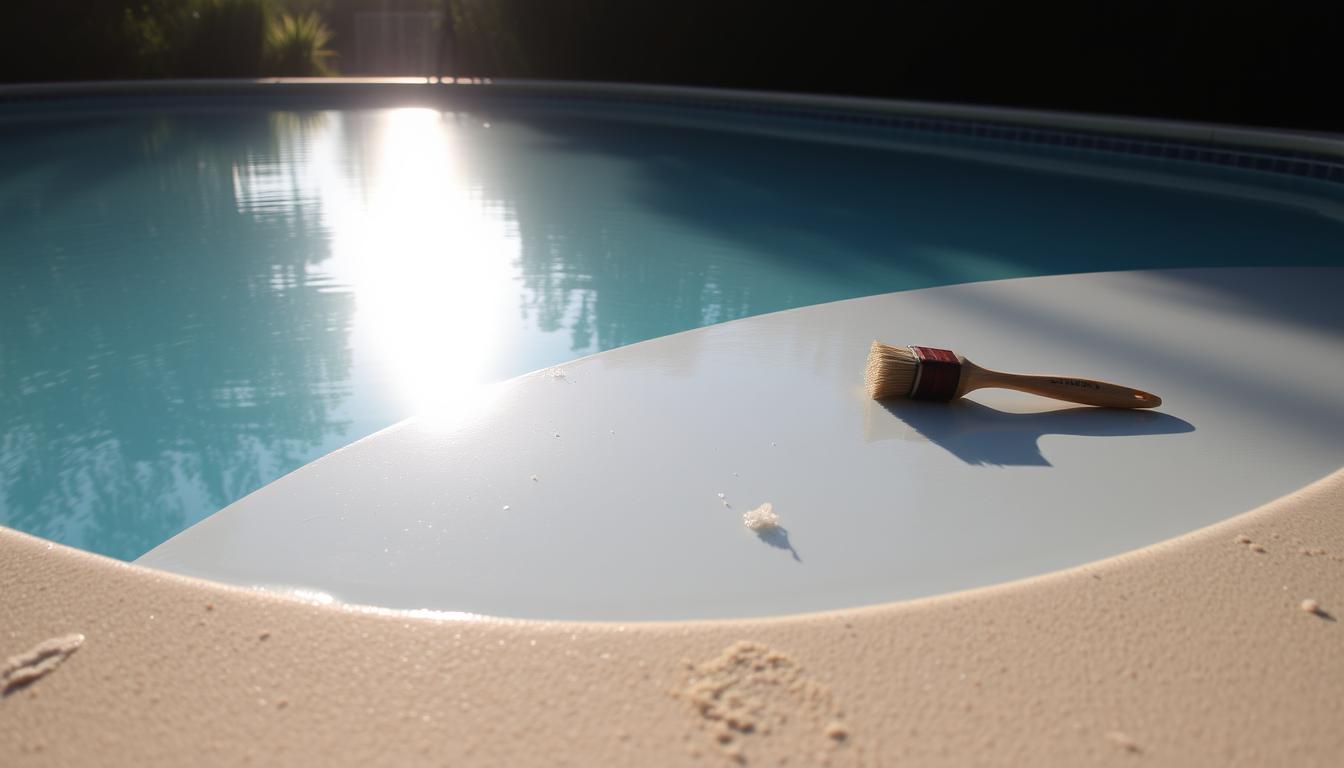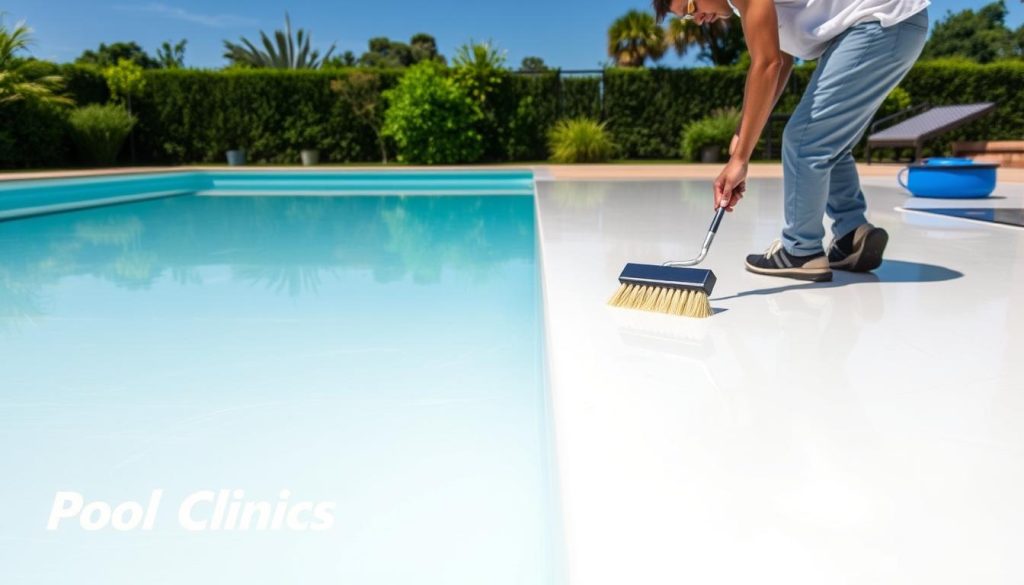
Pool owners dream of diving into a crystal-clear pool with smooth surfaces. Achieving this requires more than just wishful thinking. Brushing new pool plaster is crucial for maintenance.
Neglecting this task can cause various issues. These include plaster staining, discoloration, algae growth, and rough surfaces.
Picture this: You’ve just resurfaced your pool with beautiful new plaster. In your excitement, you forget to brush it regularly during the first few weeks.
Soon, your dream pool becomes a cloudy, stained mess. Algae clings to the rough surfaces. This heartbreaking sight could have been avoided with proper care.
Let’s explore the consequences of not brushing new pool plaster. We’ll also discuss the importance of proper plaster care.
Understanding these issues can help maintain your pool’s surface. With the right care, your backyard oasis will remain a joy for years to come.
Key Takeaways
- Brushing new pool plaster is essential for removing plaster dust and debris, ensuring smooth and even curing.
- Neglecting to brush new plaster can lead to cloudy water, staining, algae growth, and rough surfaces.
- Regular brushing and proper pool chemistry maintenance are crucial for protecting your investment and ensuring a clean, safe pool.
- The first few weeks after resurfacing are critical for the long-term health and appearance of your pool plaster.
- Proper plaster care involves brushing at least twice daily for the first week and maintaining balanced pH, alkalinity, and calcium hardness levels.
The Importance of Brushing New Pool Plaster
Proper care after resurfacing your pool is crucial for its longevity. Brushing new plaster is a key part of this care. It prevents issues that can arise from neglecting this task.

The cement in new plaster cures during the first month. About 85% of curing happens in this time. Brushing ensures smooth curing and prevents plaster delamination.
It also helps manage water chemistry effectively. Regular brushing is essential for a healthy pool surface.
Removing Plaster Dust and Debris
New plaster can leave tiny particles and dust on the surface. If not removed, these can cause rough spots and staining. Brush your pool twice daily for the first week.
This helps remove debris and ensures a smoother surface. It also prevents potential issues in the future.
Ensuring Smooth and Even Plaster Curing
The first four weeks after resurfacing are critical for your pool’s appearance. Timely brushing promotes even coverage of the plaster. It prevents uneven curing and surface irregularities.
This care helps avoid plaster delamination. It ensures a long-lasting, beautiful pool finish.
| Pool Maintenance Task | Frequency |
|---|---|
| Routine pool brushing | Once a week |
| Brushing for new pool plaster | Twice daily for the first week |
| Water testing post-renovation | Weekly for the first month, then monthly |
Preventing Staining and Discoloration
Regular water testing and brushing help prevent discoloration and staining. Adjust pH, alkalinity, and calcium levels consistently. Keep the Calcium Saturation Index (CSI) below 0.6.
This prevents scaling and calcium nodule formation. These issues can occur due to bonding failure in pool plastering.
Understanding the relationship between Calcium Hardness and a plastered pool is crucial for longevity and maintenance.
Regular brushing and water chemistry management are vital for your new plaster. They help avoid common issues like surface etching and staining. This ensures a beautiful, long-lasting pool finish.
What Happens If You Don’t Brush New Pool Plaster
Skipping proper care for your newly plastered pool can cause various issues. These problems affect the pool’s looks, lifespan, and swimming experience. Following post-resurfacing instructions and resurfacing treatment aftercare is crucial.
Plaster Dust Buildup and Cloudy Water
Not brushing new pool plaster leads to plaster dust buildup. This makes your pool water cloudy and unappealing. Experts say cloudiness can stem from poor filtration, circulation, and water chemistry balance.
Tiny particles and early algae growth also contribute to cloudiness. Swimmers can worsen the problem by depleting disinfectants and adding contaminants. Chlorine shock can help clear water, but brushing prevents dust buildup.
Rough, Uneven Surfaces
Neglecting to brush can result in rough, uneven pool surfaces. These pool finish imperfections feel uncomfortable and harbor bacteria and algae. Most pool plaster cures within the first month, making regular brushing vital.
Rough surfaces can cause injuries and safety hazards. Proper brushing techniques ensure a smooth pool surface. Follow post-resurfacing instructions to maintain safety and comfort.
Algae Growth and Bacterial Hazards
Settled plaster dust creates a perfect environment for algae and bacteria. Poor water chemistry balance and contaminants speed up their growth. This makes your pool unattractive and potentially dangerous.
Some bacteria can cause skin irritations and infections. Regular brushing prevents debris buildup and maintains a cleaner swimming environment. Include brushing in your resurfacing treatment aftercare routine.
Increased Risk of Plaster Degradation and Staining
New pool finishes are prone to staining and discoloration in the first month. Ignoring these issues can lead to lasting pool finish imperfections. Proper care is essential for maintaining appearance and longevity.
Brushing prevents calcium scale formation, which causes pitting and deterioration. It also helps distribute chemicals evenly, ensuring balanced water chemistry. Regular brushing extends your pool plaster’s life and keeps it looking great.
Conclusion
Skipping pool plaster brushing can lead to numerous problems. These include unsightly dust buildup, rough surfaces, and potential health hazards. Regular brushing preserves your pool’s beauty and integrity, reducing the need for costly repairs.
A consistent brushing routine protects your investment and ensures a safe swimming environment. Proper care includes maintaining pH levels between 7.4 and 7.6. Weekly water testing is also crucial for optimal pool health.
Standard pool plaster lasts about ten years with good maintenance. Advanced finishes like StoneScape can last up to 25 years. These options offer both durability and visual appeal.
Partnering with a professional pool service provider is essential for best results. Experts offer guidance on proper care and assist with water testing. They can help navigate factors like salt chlorine generators that affect surface longevity.
Professional pool care brings long-term savings and peace of mind. With expert help, you can enjoy a well-maintained pool for years to come.







